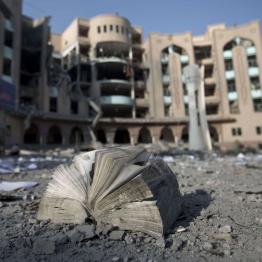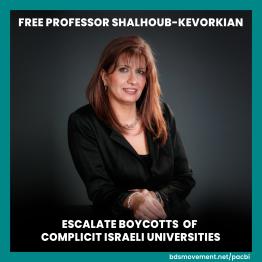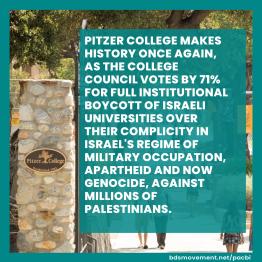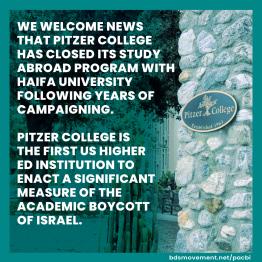Over 100 Middle East Studies Scholars and Librarians Call for the Boycott of Israeli Academic Institutions
The following letter calling on scholars and librarians within Middle East studies to boycott Israeli academic institutions was submitted in the name of the below signatories to Jadaliyya on 6 August 2014.
[The following letter calling on scholars and librarians within Middle East studies to boycott Israeli academic institutions was submitted in the name of the below signatories to Jadaliyya on 6 August 2014.]
We, the undersigned scholars and librarians working on the Middle East, hold that silence about the latest humanitarian catastrophe caused by Israel’s new military assault on the Gaza Strip—the third and most devastating in six years—constitutes complicity. World governments and mainstream media do not hold Israel accountable for its violations of international law. We, however, as a community of scholars engaged with the Middle East, have a moral responsibility to do so.
Neither the violation of international law nor the destruction of Palestinian life in Gaza, however, began or will end with the current war. Israel has maintained an illegal siege on the Gaza Strip for seven years. It has limited the movement of people and goods in and out of Gaza, rationing Palestinian calorie intake at just above subsistence levels.1 Moreover, the suffering of Palestinians is not limited to Gaza: the occupation and dispossession in East Jerusalem, the Naqab (Negev), and the West Bank; the construction of walls and fences around the Palestinian population, the curtailment of Palestinian freedom of movement and education, and the house demolitions, all have long histories and no apparent end in sight. They will continue unless people around the world act where their governments have failed.
As employees in institutes of higher learning from around the world, we have a particular interest in and responsibility to respond to the obstacles to the right to higher education that the Israeli state has created for Palestinians both inside Israel and in the occupied territories. In the past two months alone, Israeli forces have raided Al Quds University in Jerusalem, the Arab American University in Jenin, and Birzeit University near Ramallah.2 In the current attacks, Israeli aerial bombardment has destroyed the Islamic University of Gaza. More generally, the Israeli state discriminates against Palestinian students in Israeli universities;3 and it isolates Palestinian academia by, among other tactics, preventing foreign academics from visiting Palestinian institutions in Gaza and the West Bank.4 We are also alarmed by the long history of confiscations of Palestinian archives and the destruction of libraries and research centers.5
The on-going Israeli massacres in Gaza have been ghastly reminders of the complicity of Israeli academic institutions in the occupation and oppression of Palestinians. Tel Aviv University, the Hebrew University of Jerusalem, Bar Ilan University, Haifa University, Technion, and Ben Gurion University have publicly declared their unconditional support for the Israeli military.6 More generally, there are intimate connections between Israeli academic institutions and the military, security, and political establishments in Israel.7 To take but one example: Tel Aviv University is directly implicated, through its Institute for National Security Studies (INSS), in developing the Dahiya Doctrine,8 adopted by the Israeli military in its assaults on Lebanon in 2006 and on Gaza today. The Dahiya Doctrine advocates the extensive destruction of civilian infrastructure and “intense suffering” among the civilian population as an “effective” means to subdue any resistance.9
Our colleagues in the Israeli academy have been silent, by and large, in the face of such violence and injustice. We applaud the few dozen Israeli academics who have protested against their government, and the several dozen who signed a petition calling for an end to Israel’s bombardment of Gaza.10 Alarmingly, they have faced disciplinary measures from their own universities.11 We stand by these academics and support them in what is our joint struggle.
As Middle East scholars and librarians, we feel compelled to join the growing number of academics in Israel and around the world who support the Palestinian call to boycott Israeli academic institutions. This call responds to Palestinian civil society organizations’ long-standing appeal for the comprehensive implementation of boycotts, divestments, and sanctions (BDS) of Israel, and is supported by the Palestinian Federation of Unions of University Professors and Employees (PFUUPE).
Following in the footsteps of the growing number of US academic associations that have endorsed boycott resolutions,12 we call on our colleagues in Middle East Studies to boycott Israeli academic institutions, and we pledge not to collaborate on projects and events involving Israeli academic institutions, not to teach at or to attend conferences and other events at such institutions, and not to publish in academic journals based in Israel. We call for doing so until such time as these institutions end their complicity in violating Palestinian rights as stipulated in international law, and respect the full rights of Palestinians by calling on Israel to:
- End its siege of Gaza, its occupation and colonization of all Arab lands occupied in June 1967, and dismantle the settlements and the walls;
- Recognize the fundamental rights of the Arab-Palestinian citizens of Israel and the stateless Negev Bedouins to full equality; and
- Respect, protect, and promote the rights of Palestinian refugees to return to their homes and properties as stipulated in UN Resolution 194.
Signatories
[**Academics and librarians interested in signing this statement should visithttp://tinyurl.com/MEscholarsboycott (recommended) or email MEscholarsboycott@gmail.com with their name, title, and affiliation.]
[For media inquiries, please contact Professor Jens Hanssen via MEscholarsboycott@gmail.com or +1-416- 9783143]
Saleh Abdel Jawad
Associate Professor of Political Science, Birzeit University
Nahla Abdo
Professor, Anthropology and Sociology Department, Carleton University
Rabab Ibrahim Abdulhadi
Associate Professor of Ethnic Studies/Race and Resistance Studies, San Francisco State University
Osama Abi-Mershed
Associate Professor, Department of History, Director, Center for Contemporary Arab Studies, Georgetown University
Nadia Abu El-Haj
Professor of Anthropology, Barnard College–Columbia University
Lila Abu-Lughod
Joseph L. Buttenwieser Professor of Social Science, Columbia University
Gilbert Achcar
Professor of Development Studies and International Relations, SOAS, University of London
Fida Adely
Associate Professor, School of Foreign Service, Georgetown University
Nadje Al-Ali
Professor of Gender Studies, SOAS, University of London
Fadwa Allabadi
Associate Professor, Insan Center for Gender Studies, Al-Quds University
Lori Allen
Lecturer, Middle Eastern Studies, University of Cambridge
Gil Anidjar
Professor, Departments of Religion and Middle Eastern, South Asian, and African Studies (MESAAS), Columbia University
Sinan Antoon
Associate Professor, New York University
Talal Asad
Distinguished Professor of Anthropology, CUNY
Kamran Asdar Ali
Associate Professor, Anthropology, University of Texas at Austin
Barbara Aswad
Professor Emeritus of Anthropology, Wayne State University, and Past President of the Middle East Studies Association of North America
Cemil Aydin
Associate Professor of History, University of North Carolina, Chapel Hill
Kathryn Babayan
Associate Professor of History, Director of the Center of Armenian Studies, University of Michigan
Mohammed Bamyeh
Professor of Sociology, University of Pittsburgh
Asef Bayat
Catherine and Bruce Bastian Professor of Global and Transnational Studies and Professor of Sociology and Middle Eastern Studies, University of Illinois at Urbana-Champaign
Joel Beinin
Donald J. McLachlan Professor of History and Professor of Middle East History, Stanford University
George Bisharat
Professor, UC Hastings College of the Law
Marilyn Booth
Iraq Professor of Arabic and Islamic Studies, University of Edinburgh
Glenn Bowman
Reader in Social Anthropology, Director of Research, School of Anthropology and Conservation, University of Kent, Canterbury
Haim Bresheeth
Senior Teaching Fellow, Centre for Media Studies, School of Oriental and African Studies
Michaelle Browers
Associate Professor of Politics and International Affairs, Wake Forest University
Louise Cainkar
Associate Professor of Sociology, Marquette University
John Collins
Professor of Global Studies, St. Lawrence University
Miriam Cooke
Braxton Craven Professor of Arab Cultures, Duke University
Hamid Dabashi
Hagop Kevorkian Professor of Iranian Studies and Comparative Literature, Columbia University
Omar Dahi
Associate Professor of Economics, Hampshire College
Linda T. Darling
Professor of History, University of Arizona
Rochelle Davis
Associate Professor of Anthropology, Georgetown University
Lara Deeb
Professor of Anthropology, Scripps College
Omnia El Shakry
Associate Professor, Department of History, University of California, Davis
Samera Esmeir
Associate Professor, Department of Rhetoric, University of California-Berkeley
John L. Esposito
University Professor & Founding Director, Prince Alwaleed Bin Talal Center for Muslim-Christian Understanding, Georgetown University
Khaled Fahmy
Professor of History, American University in Cairo
Richard Falk
Milbank Professor of International Law Emeritus, Princeton University
James C. Faris
Professor Emeritus, Anthropology; Director Emeritus, University of Connecticut Program in Middle East Languages and Area Studies
Mona Fawaz
Associate Professor of Urban Studies and Planning, American University of Beirut
Ilana Feldman
Associate Professor, Anthropology, History, and International Affairs, George Washington University
Nancy Gallagher
Research Professor, Department of History, University of California, Santa Barbara
Honaida Ghanim
General Director,
The Palestinian Forum for Israeli Studies (MADAR)
Farha Ghannam
Associate Professor, Anthropology, Swarthmore College
Amal Ghazal
Associate Professor of Modern Middle Eastern History, Dalhousie University
Irene L. Gendzier
Professor Emeritus, Political Science, Boston University
George Giacaman
Associate Professor of Philosophy and Cultural Studies, Birzeit University
Yvonne Haddad
Professor of History of Islam and Christian-Muslim Relations, Georgetown University
Sherine Hafez
Associate Professor, Women’s Studies and Middle East & Islamic Studies, University of California, Riverside
Elaine Hagopian
Professor Emerita of Sociology, Simmons College
Samira Haj
Professor of History, CUNY-GC/CSI
Sondra Hale
Research Professor/Professor Emerita, Departments of Anthropology and Gender Studies, University of California, Los Angeles.
Wael B. Hallaq
Avalon Foundation Professor in the Humanities, Columbia University
Rema Hammami
Associate Professor of Anthropology, Birzeit University
Juliane Hammer
Associate Professor, Religious Studies Department, University of North Carolina, Chapel Hill
Sari Hanafi
Professor of Sociology, American University of Beirut
Jens Hanssen
Associate Professor of Middle Eastern and Mediterranean History, Departments of History and Near & Middle Eastern Civilizations, University of Toronto
Mona Harb
Associate Professor, Urban Studies and Politics, American University of Beirut
Barbara Harlow
Louann and Larry Temple Centennial Professor of English Literature, University of Texas at Austin
Frances S. Hasso
Associate Professor in Women's Studies and Sociology, Duke University
Charles Hirschkind
Associate Professor, Anthropology, UC Berkeley
Islah Jad
Associate Professor, Women's Studies Institute, Bir Zeit University
Manal A. Jamal
Associate Professor of Political Science, James Madison University
Suad Joseph
Distinguished Professor of Anthropology and Women’s Studies, University of California-Davis
Rhoda Kanaaneh
Adjunct Associate Professor, Middle East Instiute, Columbia University
Vangelis Kechriotis
Associate Professor of History, Boğazici University
Rashid Khalidi
Edward Said Professor of Modern Arab Studies and Professor of History, Columbia University
Tarif Khalidi
Sheykh Zayed Chair of Arabic and Islamic Studies, American University of Beirut
Laleh Khalili
Professor of Middle East Politics, SOAS, University of London
Ronit Lentin
Associate Professor, Sociology, Trinity College Dublin
Mark LeVine
Professor of Modern Middle Eastern Hitory, UC Irvine
Yosefa Loshitzky
Professorial Research Associate, School of Oriental and African Studies
Nur Masalha
Professor of Religion and Politics, St Mary's University College, University of London
Brinkley Messick
Professor of Anthropology, Columbia University
Laurence Michalak
Emeritus Vice Chair, Center for Middle Eastern Studies, University of California-Berkeley
Timothy Mitchell
Professor, Department of Middle Eastern, South Asian, and African Studies, Columbia University
Amira Mittermaier
Associate Professor, Department of Religious Studies and Near & Middle Eastern Civilizations, University of Toronto
Karma Nabulsi
Professor of Politics and International Relations, University of Oxford, Fellow in Politics, St Edmund Hall
Eiji Nagasawa
Professor, Institute for Advanced Studies on Asia, The University of Tokyo
Isis Nusair
Associate Professor of International Studies and Women’s Studies, Denison University
Roger Owen
A.J. Meyer Emeritus Professor of Middle East History, Harvard University
Ilan Pappe
Professor of History, Director of the European Centre for Palestine Studies, University of Exeter
Laila Parsons
Associate Professor, Department of History and Classical Studies, Institute of Islamic Studies, McGill University
Gabriel Piterberg
Professor of Middle East History, UCLA
Shira Robinson
Associate Professor of Middle Eastern History, George Washington University
Adam Sabra
Professor of History and King Abdul Aziz Ibn Saud Chair in Islamic Studies,
University of California, Santa Barbara
George Saliba
Professor of Arabic and Islamic Science Department of Middle East and Asian Languages and Cultures, Columbia University
Ihab Saloul
Assistant Professor of Cultural Studies, University of Amsterdam
Nisreen Salti
Associate Professor of Economics, American University of Beirut
Aseel Sawalha
Associate Professor, Anthropology, Fordham University
Rosemary Sayigh
Visiting Professor at the Center for Arab and Middle East Studies, American University of Beirut
Kirsten Scheid
Associate Professor of Anthropology, American University of Beirut
Paul Sedra
Associate Professor of Middle East History, Simon Fraser University
May Seikaly
Associate Professor of Modern Middle East History, Wayne State University
Elyse Semerdjian
Associate Professor of History, Whitman College
Anton Shammas
Professor of Middle Eastern Studies and Comparative Literature, University of Michigan
Stephen Sheehi
Sultan Qaboos bin Said Chair of Middle East Studies, College of William and Mary
Todd Shepard
Associate Professor, History, John Hopkins University
Magid Shihade
Birzeit University
Lisa Taraki
Associate Professor of Sociology, Birzeit University
Mohamad Tavakoli-Targhi
Professor of History, Historical Studies & Near and Middle Eastern Civilizations, University of Toronto
Judith E. Tucker
Professor of History, Georgetown University
Lisa Wedeen
Mary R. Morton Professor of Political Science and the College, The University of Chicago
Jessica Winegar
Associate Professor, Anthropology, Northwestern University
**Institutional Affiliations are for identification purposes only.
1 Associated Press, "Israel used calorie-count to limit Gaza food during blockade, critics claim," The Guardian, 17 October 2012, http://www.theguardian.com/world/2012/oct/17/israeli-military-calorie-limit-gaza.
2 See incident report on Academic Freedom Monitor of Scholars at Risk Network, http://monitoring.academicfreedom.info/reports/2014-06-22-birzeit-university-arab-american-university-al-quds-university-palestine.
3 The Arab Cultural Association, Annual Summary Report 2011-12, November 2012, http://alrasedproject.files.wordpress.com/2013/02/alrased1_eng.pdf.
4 Campaign for the Right to Enter the Occupied Palestinian Territory (OPT), Academia Undermined: Israeli Restrictions on Foreign National Academics in Palestinian Higher Education Institutions, May 2013, http://www.pchrgaza.org/files/2013/Education%20Report%20Academia%20Undermined%20May%202
013.pdf
5 Gish Amit, "Salvage or plunder? Israel's 'collection' of private Palestinian libraries in West Jerusalem," Journal of Palestine Studies 40 (July 2011): 6-23.
6 http://www.shalomlife.com/business/24941/how-tel-aviv-university-supports-the-idf. Also, see the following: for Haifa University, https://www.facebook.com/HaifaUniversity/posts/10152140137120044; for Technion,
https://www.facebook.com/Technion.Israel/photos/a.170241609659974.47375.149494148401387/9060544694
12014/?type=1&theater; for Bar Ilan, https://www.facebook.com/barilanwall/photos/a.189536784430293.62558.120725437978095/7726621594
51083/?type=1&theater
7 Gil Eyal, “Military Establishment and Middle East Studies,” in The disenchantment of the Orient: Expertise in Arab Affairs and the Israeli State (Stanford University Press, 2008), 185-236. See also: Keller, Uri Yacobi. “The Academic Boycott of Israel and the Complicity of Israeli Academic Institutions in Occupation of Palestinian Territories.” Alternative Information Center (http://electronicintifada.net/files/091214-academic-boycott.pdf)
8 See The Goldstone Report, 24, and http://electronicintifada.net/files/090708-soas-palestine-society.pdf
9 http://imeu.org/article/the-dahiya-doctrine-and-israels-use-of-disproportionate-force.
10http://haimbresheeth.com/gaza/an-open-letter-to-israel-academics-july-13th-2014/and reported here:http://electronicintifada.net/blogs/ali-abunimah/handful-israeli-academics-responds-call-condemn-gaza-slaughter
12 These associations are: the Critical Ethnic Studies Association (CESA), African Literature Association (ALA), Native American and Indigenous Studies Association (NAISA), Association for Humanist Sociology (AHS), Association of Asian American Studies (AAAS), and American Studies Association (ASA).




